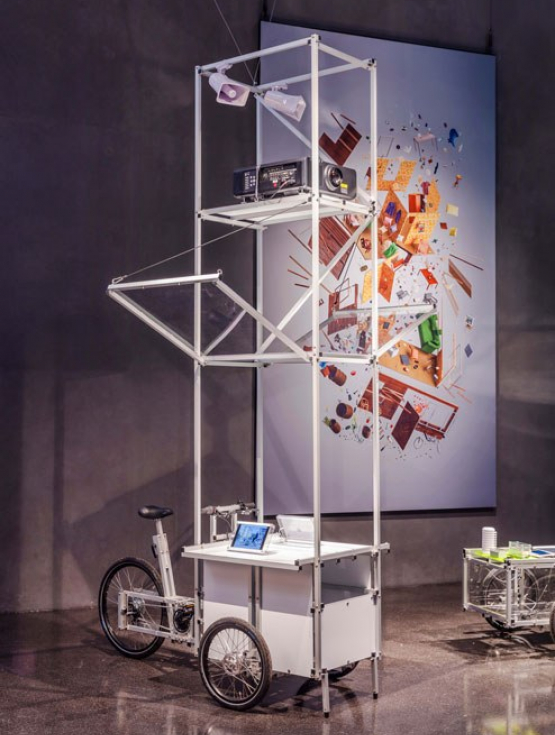
Credits: N55 & Till Wolfer
Rediscovering mobility with urban innovations
Mobile Mobility Workshop
The art collective N55 and designer Till Wolfer want to revolutionise our view of urban mobility and the city of the future. Their actions and inventions show how different mobility of the future could be in future cities. Parking spaces for cars become mobile parks for people, cargo bikes become mobile workshops or a mobile kitchen. For the Futurium Lab, they have built a mobile mobility workshop. This brings the discussion about the future of mobility to where mobility really takes place: in public space.

Credits: N55 & Till Wolfer
When Till Wolfer and N55 talk about their projects, the term 'concrete utopia' often comes up. Instead of abstract ideas for distant futures, they focus on changes that are already possible today. In partnership with Futurium, the designers and artists have developed two cargo bikes specially adapted to lead mobile workshops on the future of mobility. N55 and Till Wolfer have become known for their urban interventions. An urban intervention is an action in the city that shows that something could be completely different. For N55 and Till Wolfer, this means making power structures in cities visible, questioning them in a playful way and suggesting alternatives.
Credits: N55 & Till Wolfer
Opening your eyes to alternatives
The PARKCYCLE SWARM project is a good example of how urban interventions can work. For the programme, N55 and Till Wolfer converted cargo bikes into mobile gardens. Bike frames were topped with large platforms, about the size of a car, and covered in greenery, so that the green space could be pedalled around town. A few bikes parked next to each other provided enough green space for a small public park. Instead of taking up space in the city permanently, the PARKCYCLE SWARM bikes invite people to sit and linger, transforming public spaces. Parking spaces for cars become parks for people. Urban interventions like this show how different our cities could look.
Mobile debate/discussion
The Mobile Mobility Workshop also aims to open up new perspectives on the future of mobility and the city of the future. It consists of two cargo bikes. One of them is always on the road in Berlin and serves as a mobile platform for public workshops and urban interventions. The other bike remains on display in the Futurium, educating visitors about conversations and decisions that have resulted from the workshops. How can transportation methods become more eco-friendly? Do we want fewer cars in the city in the future? And what can we do right now to change the city we live in? With questions like these, it’s important to gather as many perspectives as possible.
Credits: N55 & Till Wolfer
Modular design
The way the Mobile Mobility Workshop bikes are manufactured also points towards a possible future. Today, most bikes are put together in huge factories and then shipped thousands of miles away to be sold. The XYZ CARGO bikes by N55 and Till Wolfer are made a little differently. Their bikes are built in a local micro factory. No big machines or assembly lines - each cargo bike is assembled individually and with each worker treated fairly. Producing the bikes locally protects the climate, by cutting out the shipping. And it saves on materials, because manufacturing bikes individually produces less waste. The bikes are also built with a modular design - this means they can be modified at any time to suit the owner’s needs, and can be repaired easily. This is part of Till Wolfer’s and N55’s concrete utopia mindset. In their manifesto, they write: "Either we learn to share knowledge and resources in a fair way, or the human race will destroy ourselves and the planet."
Credits: N55 & Till Wolfer
In the future, locally and modularly built vehicles could save a lot of energy and space in the city. Instead of buying a new vehicle every few years, old vehicles could simply be converted into different forms. At XYZ CARGO, you can already use modules to customise your cargo bike for each individual trip - depending on whether you want to use it as a transporter, mobile kitchen, DJ bike or mobile FabLab. Instead of driving around in a huge SUV to make a short trip in the middle of the city, you could turn your van into a racing bike in just a few simple steps.